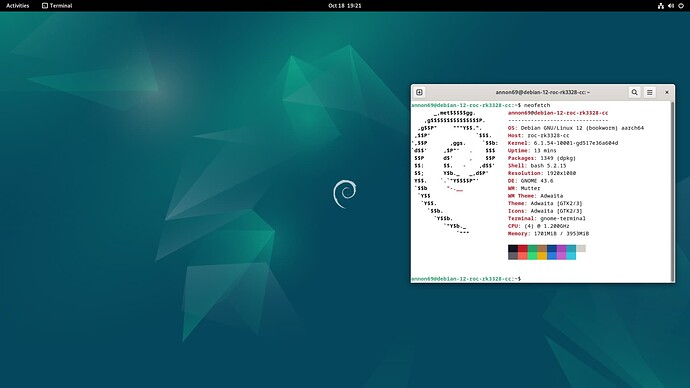Following this post. I too am interested to know if the HA_OS can run as clean as the raspien image is designed.
are you having trouble because of your user? that’s what it sounds like to me. Is this going to be a dev box or a production system?
create a user using the adduser command. then add that user to the sudo group doing a usermod -aG sudo newuser. then edit your sudo file adding the user to the last line and choose how much god powers you want that user to have.
then you can reboot, login using your new user (sudo -u newuser), do an apt install apache2 or nginx and you should be on your way.
I tried downloading Debain 11 from their website, using balena to flash it to as sd card but am having issues with le potato not booting up. Any help would be much appreciated - thanks
Thank you for the Bookworm image and continued support! I dd’d Armbian and some other images and there were random issues but yours worked like a charm!
EDIT: I spoke to soon. As soon as I rebooted after first boot up I was reminded why I earlier had been looking for other distros. The network is not working and the screen is filled with information about end0 IPv6 link becomes ready, configuring for ply/rmii link mode and etc etc. This goes on and on.
I am trying to connect through SSH to the ROC-RK-3328 but I can’t, I wonder if if your Bookworm by default SSHD has been setup to use a different port from 22, thanks! ![]()
SSH is not enabled by default for security reasons. We try not to modify distro default behavior unless there’s a very good reason to.
But without ssh enabled, how I can install/use this board headless ? Do I need to hook up a serial-usb cable ? I think, because this is a singleboard and setting up a serial-usb connection or a keyboard / hdmi is often not ideal, having an active sshd on boot might be a reason good enough ![]()
No, this violates the default security state of the images. We will release server images with cloud-init to pre-configure the system with ssh settings but the base images will not have ssh.
Having the possibility to configure the image is a great solution ! thank you ![]()
I really did not expect to see Debian images being released. Thanks guys.
And for those wondering about how well gnome runs, it’s just fine.
Tested the latest Debian Bookworm image on a Sweet Potato and it’s working great, nonetheless I have recommendations for a future release:
- No keymaps are installed by default so dpkg-reconfigure keyboard-configuration has not effect and the local keyboard is stuck in US qwerty. You should include the kbd and console-setup packages by default to fix that.
- I understand why the SSH server is not installed by default, but then why does the image include exim and openvswitch enabled by default? These are very specific applications that should not be part of a default installation.
- systemd is configured to automatically create a swap file on the root filesystem which is probably not a good idea, especially if it’s a btrfs partition compressed with zstd. swap should be disabled by default or at least located on a dedicated swap partition.
We will fix that on the next regen.
exim was carried in by some other package. openvswitch was included due to plans for Debian server release. We will drop it from the base image.
We do not create swap partitions where possible. Btrfs supports in FS swapfile with nocow so it is entirely reasonable to do so as it can be configured by the user. Swap partitioning is harder on the user and more prone to issues since fstab and other elements have to be created. There is no atomic way of doing this on first boot so that is less reliable when SBCs can crash at any time due to flaky power.
We are planning to move to ignition pre-configuration for the images.
hello,
for LaFrite board (s805x-ac) which distro of DEBIAN 12 :
|[debian-12-base-arm64+all-h3-cc-h5.img.xz]
|[debian-12-base-arm64+aml-s905x-cc.img.xz]
|[debian-12-base-arm64+arm64.img.xz
|[debian-12-base-arm64+roc-rk3328-cc.img.xz]
|[debian-12-base-armhf+all-h3-cc-h3.img.xz]
|[debian-12-base-armhf+arm32.img.xz]
|[debian-12-gnome-arm64+all-h3-cc-h5.img.xz]
|[debian-12-gnome-arm64+aml-s905x-cc.img.xz]
|[debian-12-gnome-arm64+arm64.img.xz]
|[debian-12-gnome-arm64+roc-rk3328-cc.img.xz]
|[debian-12-gnome-armhf+all-h3-cc-h3.img.xz]
|[debian-12-gnome-armhf+arm32.img.xz]
thank you
La Frite has onboard firmware so +arm64.img.xz. make sure to get the latest firmware update.
The default gnome desktop is quite heavy for the old Le Potato. It would be nice to have something lighter like xfce4. So I tried to boot into the base image and then install xfce4 through apt get. However it does not work. Need some help.
You can try the Raspbian 12 images we are releasing this week. They’re lighter since they use wlroots and don’t have the full Gnome stack. We won’t be releasing anything based on X11.
I recently purchased a Renegade ROC-RK3328-CC 4GB. I tried using Armbian at first but it seems it lacks out of the box accelerated graphics support unless you a legacy image and a community support set of packages. From there I installed debian-12-gnome-arm64+roc-rk3328-cc.img.xz and while it does seem to have accelerated graphics (checked via chrome about:gpu) the UI seems very laggy. I am booting from a microSD card (SanDisk 64GB Extreme microSDXC). Is this to be expected or am I am missing a step or two? Thanks.
